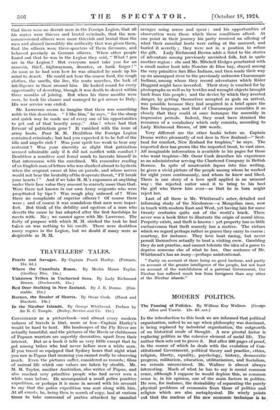TRAVELLERS' TALES.
Where the Cannibals Roam. By Merlin Moore Taylor. (Geoffrey Bles. 16s.) Unknown Tribes in Uncharted Seas. By Lady Richmond Brown. (Duckworth. 21s.) In the Nicobar Islands. By George Whitbread. Preface by Sir R. C. Temple. (Seeley, Service and Co. 21s.)
CONSIDERED as a picturebook—and almost every modem volume of travels is that, more or less—Captain Hurley's would be hard to beat. His landscapes of the Fly River are actually beautiful, and the pictures of the Ravis or clubhouses of Papuan warriors are superbly decorative, apart from their interest. But as a book it tells us very little except that he got among tribes who had never before seen a white man. If you travel so equipped that Sydney hears that night what you saw in Papua that morning you cannot really be observing much. Even the pictures suffer, considered as records ; films of animal life which one values are taken by stealth. Mr. M. M. Taylor, another Australian, also writes of Papua, and also reached very primitive people who had never seen a white man before. He accompanied a small police punitive expedition, or perhaps it is more in accord with his account to say that the police expedition was sent along with him. At all events, he, being then in search of copy, had at various times to take command of parties attacked by cannibal
savages using arrow and spear ; and his opportunities of observation were those which these conditions afford. At one point in their journey his party received an offering of what their cannibal hosts• were eating at the moment, and buried it secretly ; they were not in a position to refuse the gift. Lady Richmond Brown adds a third to the stories of adventure among previously unvisited folk, but in quite another region : she and Mr. Mitchell Hedges penetrated with a small motor boat into Nombre de Dios bay, stayed among the very primitive San Bias Indians, and then made their way up an unmapped river to the previously unknown Chummaque Indians, among whom they record adventures which Rider Haggard might have invented. Their story is vouched for by photographs as well as by textiles and wrought objects brought back from this people ; and the device by which they averted danger, by getting themselves accepted as gods on arrival, was possible because they had acquired in a brief space the San Bias language, and that of Chucunaque resembles it so closely that they could at once harangue the assembly in impressive periods. Indeed, they must have Strained the resources of a vocabulary which only consists, according to Lady Richmond Brown, of 200 words.
Very different are the other book; before us. Captain Donne writes pleasantly of red deer in New Zealand—" Scot- land for comfort, New Zealand for trophies," he says. The imported deer has grown like the imported trout, to vast sizes. All imaginable information is available in his pages for those who want trophies—Mr. Oscar Cook describes his experience as an administrator serving the Chartered Company in British Borneo. In spite of amateurish lapses into fine writing, he gives a vivid picture of the people among whom he worked for eight years continuously, and whom he knew and liked. Mere is one story of a love spell applied in an unusual way : the rejected suitor used it to bring to his heel the girl who threw him over—so that he in turn might reject her.
Last of all there is Mr. Whitbread's sober, detailed and informing study of the Nicobarese—a Mongolian race, now in touch with modern East and West, yet having lain for some twenty centuries quite out of the world's track. There never was a book fitter to illustrate the origin of moral ideas. Property exists, and theft is known : yet property has so little exclusiveness that theft scarcely has a motive. The virtues which we regard perhaps rather as graces they carry to excess ; courtesy, for instance. They love boat racing, but never permit themselves actually to beat a visiting crew. Gambling they do not practise, and cannot tolerate the idea of a game to deprive someone else of what he has. One sentence of Mr. Whitbread's has an irony—perhaps unintentional.
"Partly on account of there being no good harbour, and partly on account of the greater intelligence of the people, but not least on account of the watchfulness of a paternal Government, Car Nicobar has suffered much less from foreigners than any other of the Nicobar islands."


























































 Previous page
Previous page